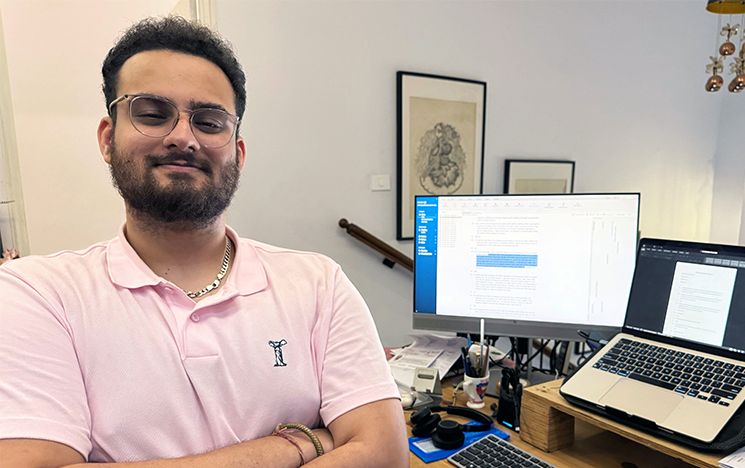Adwait's story

I learned the importance of empathy, active listening and finding a common language to better understand a client’s perspective.”Adwait Vaishnavi
Clinical Psychology and Mental Health MSc
“I’ve always gravitated to ideas around the arts and human behaviour. I was originally set on becoming a journalist, but studying an elective in criminal psychology during my undergrad degree introduced me to the world of psychological research.
I was tasked with writing an article on personality traits, but I began drawing parallels between anger, hostility and cardiac health. Having noticed a trend, and feeling the spark to do something with it, my classmates and I wrote a paper which was published in the International Journal of Indian Psychology. It was my first big break, and it didn’t even feel like work.
I grew up in India but was keen to experience higher education in the UK. I applied to the Clinical Psychology and Mental Health MSc at Sussex as it felt like a great way to connect my interests while diversifying my skillset. I was also fascinated by the work being conducted by academics across the Department of Psychology.
I started my course with little idea of what to expect, but as a graduate, I’d trade anything to be a student at Sussex again. I loved the vibrant culture, and Brighton is delightful – it’s a very welcoming, accommodating and accepting place to be. From cute cafes to lively pubs and clubs, the city has something for everyone.
My Masters helped me to explore the skills, challenges and resilience experienced by clinical psychologists. I particularly enjoyed classes with Dr Mark Hayward, who brought together the theoretical and practical aspects of therapeutic conversation. I learned the importance of empathy, active listening and finding a common language to better understand a client’s perspective.
Under the guidance of Dr. Kate Cavanagh, I wrote my dissertation on the use of the Headspace platform within the NHS workforce. Her insights around developing codes and deciphering data was crucial to my understanding and final analysis, and she was able to broaden my discussion points, engage with difference of opinion, and encourage me when I did good work. This was one of many ways in which my course helped me to develop and understand the integral nuances to being a good psychologist.
Since graduating, I’ve joined the Mersey Care NHS Foundation Trust in Liverpool, where I’m supporting a study that analyses the clinical and cost effectiveness of quetiapine - an antipsychotic medication often prescribed to people with borderline personality disorder (BPD). My role involves travelling between mental health clinics throughout Merseyside and Lancashire to discuss the trial with patients who engage with community mental health services. Along with recruiting participants, I also collect trial data in clinics and patients’ homes to help us understand the impact of quetiapine on their lives.
In the future, I hope to pursue doctoral studies here in the UK. There are lots of paths for me to consider - I could devote my time to research, working with patients, or even becoming a full-time academic.
My biggest piece of advice for anyone considering Sussex would just be to apply, and don’t overthink it. From the Library to Academic Support, there are a million resources within and beyond your course that will make your time enjoyable and informative.”